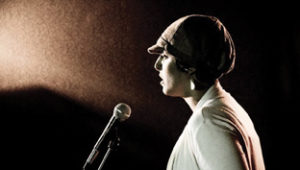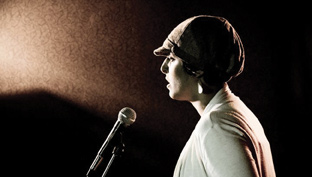Lishai Peel
Contributor
I feel like I only found my voice through spoken word.
My whole life I’ve struggled against my own silence, and spoken word has given me a way to bridge that silence, confront my ghosts, make connections and explore the richness of storytelling. Everyone has a story to tell – I just didn’t know how to express my story.

I first busted onto the scene almost a year ago, with all the unstable rawness of someone who has found something precious but is unsure of how to handle it.
Let me rewind. Spoken word for me started in the summer of 2009. I was working on the island of St. Kitts when I heard a performance by famous dub poet Yasus Afari. I was so blown away I started attending the island’s open mic nights, and finally worked up the nerve to do a poem on the stage, with the encouragement of an older woman – whom I affectionately called Rasta Mama – hollering in the background, “Jah-Lish, represent!”
I came back to Toronto and wrote for six months before finally hitting the stage in the winter of 2010. Spoken word has become central to my life ever since.
It’s not just the richness of sharing words and energy on stage – it’s the connections and the spaces in which I find myself. From basement poetry jams to international business conferences, each venue offers a different energy and audience with whom to engage.
Having said that, my interactions with spoken word have mostly been within the black community in Toronto. Hitting up Dwayne Morgan’s open mic once a month and then winning a month-long competition, Lyme and Tings, produced by Trey Anthony Studios and Sea Saw Live Productions, has introduced me to many talented artists, activists and movers and shakers within the black community.
It has been a year not only for exploring my poetry, but a year for exploring community membership in all its complexities and navigating my own mixed ethnicity while trying to carve a place for myself as a performance poet in the city.
Issues of race, privilege and whiteness really came into focus when I was working in St. Kitts. Even though I’m light-skinned, my mother’s side is Bene Israel-Indian Jewish; I had never really identified as being “white.” But as the only non-black person in the neighbourhood I was living in, I was, somewhat playfully, termed “the white girl,” and subsequently internalized this label for a while.
Since this experience, I have been constantly trying to understand my own location of privilege, my narrative of “othering” and being “othered,” and the ways in which I am complicit in systems of racism and cultural appropriation.
Doing the work I do – not just in poetry but in my interactions with different communities – there are questions around issues of solidarity and being an ally that I constantly try to analyze and reevaluate.
How do I honour histories without consuming them? How do I honour the pain and struggles of others without stealing it? How can I extend myself to other womyn without essentializing and assuming? How do I speak out in my poetry without silencing or marginalizing the voices of others? Why do I feel like I have a right to speak ‘for,’ and who is being excluded when I speak?
Coming back from my experience in St. Kitts I carried the label ‘white girl’ heavily, and was consumed with trying to do social justice work through a lens of white privilege.
I have since come to realize a few things. The Jewish Diaspora is so diverse that skin tones range from white with blonde hair to black with nappy hair. I think if I ever asked my dad, he would self-identify as being white.
But I feel particularly drawn to my ancestry through my mother’s lineage, and we are a brown skin people who have become a silent group with a colourful and complex history and interesting traditions and customs.
Identity, like most things, is so much more than words; it’s complicated and messy, and I don’t profess to understand all of this. Nor do I understand the way I am perceived as an light-skinned Indian Jew spitting rhymes in front of black audiences and how this identity intersects with race and class and community membership.
Every time I step to the mic, I carry these issues with me, and my poetry has also gone thorough an evolution as I further try to accommodate my shifting views on my own racial identify and my relationship to the subjects of my poetry.
One of my mentors, poet and educator El Jones, once wrote to me:
“We are none of us finished works, and one effect of speaking on stage can be that we seem to hold more authority or more sureness about these issues than we truly possess, by virtue of a poem being finished speech.”
We are all unfinished poems, and I just give thanks for the mentors in my life, the opportunities afforded to me to listen and to be heard and the space I have to grow as I continue to learn about the richness of the black community in Toronto and the richness of my own narrative and culture.
For more information on Lishai Peel, check out www.lishai.ca
My Spoken Word Story




